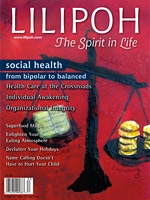Scientific Study Shows Weleda’s Infludoron Effective with the Common Cold
 By Walter Alexander
By Walter Alexander
Issue: Fall 2008: Social Health - Issue #53, Vol. 13
An observational study of infludoron (Ferrum phosphoricum comp) showed common cold patients and their physicians regard treatment with the anthroposophical remedy to be effective. Participating in the study (DR-AWB-Fephocom) were 65 physicians (naturopaths, anthroposophical physicians, pediatricians) enrolling 246 patients (95 children) with colds, in either initial or advanced stages. All patients included in the study received treatment with infludoron for between 1-30 days (mean 9 days). There were no restrictions on use of additional therapeutic measures.
Investigator Claudia Rother, MD, said that infludoron contains six ingredients: Aconitum napellus (aconite—alleviates neuralgic pains, regulates fever), Bronia alba (brony—gives structure to the metabolism and swollen tissue), eucalyptus (increases circulation, anticonvulsive, regulates mucous membranes), Eupatorium perfoliatum (boneset—sudorific [promotes sweating], expectorant, soothes muscle pains), Ferrum phosphoricum (regulates respiratory tract), and sabadilla (tones the vascular system, reduces coryza [head cold symptoms]).
Initial improvements were reported in the first three days in 62.9% of patients (74.7% children, 56.3% adults), with more improvements in those with beginning colds (73.4% versus 54% for advanced) and in children/adolescents (86.4%). There were no differences between those who did (3.0 days to initial improvement) and who did not (3.5 days) take additional remedies. At final consultation, 93.2% were either free of symptoms or had significant improvement. Complete freedom from symptoms was reported in 62.3% who had taken additional medications and in 65.3% of those who took infludoron only. Mean time to freedom from symptoms was 7 days.
Regarding the longer time to freedom from symptoms in those who took additional medications, Dr. Rother pointed out that taking allopathic medications can suppress common cold symptoms without curing the underlying malady—such that individuals will return to work prematurely, leading to a protracted illness.
A high percentage of physicians and patients (88.4% and 86.9%, respectively) assessed infludoron efficacy as “very good” to “good.” They assessed their experience with prior remedies as “very good” to “good” in only 66.9%. While tolerance of infludoron was judged as good to very good in physicians/patients (98.8%/97.2%), tolerance of mainly allopathic medications was judged as having been very good or good in 70.8%.
Most physicians said they would prescribe infludoron again (92.4%) and most patients (88%) said they would recommend it to others.
